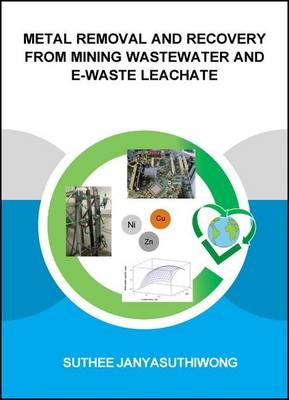
Metal Removal and Recovery from Mining Wastewater and E-waste Leachate
CRC Press (Verlag)
978-1-138-02949-1 (ISBN)
In this thesis, cost competitive technologies such as adsorption using agro-wastes and precipitation using an inverse fluidized bed (IFB) reactor were investigated, with special emphasis on the recovery of base metals. Groundnut shell showed good potential for metal (Cu, Pb and Zn) removal. From artificial neural network modeling, the performance of the sulfate reducing bacteria (SRB) was found to be strongly pH dependent; the removal efficiency of Cu and Zn in the IFB at pH 5.0 was >97%. Electronic waste is a good candidate as secondary metal resource. The recovery of Cu from computer printed circuited boards (PCBs) using biogenic sulfide precipitation was investigated as well. Using this technology, Cu could be recovered at ~0.48 g Cu/g PCBs.
Suthee Janyasuthiwong was born in 1986 in Bangkok (Thailand). He obtained his diploma in Bachelor of Science in Biology (Botany) in 2008 from Kasetsart University (Bangkok, Thailand) with second class honors under the fellowship from Science Achievement Scholarship of Thailand (SAST) by the Human Resource Development in Science Project. From 2008 to 2010, he pursued his post graduate study with specialization in Environmental Technology Toxicology and Management. This is a collaboration between the Chulabhorn Research Institute (CRI), Mahidol University (MU) and Asian Institute of Technology (AIT) under the fund from the S&T Postgraduate Education and Research Development Office (PERDO) and Royal Thai Government fellowship. From November 2011, he started his doctoral degree with the joint doctorate program supported by the Erasmus Mundus Joint Doctorate in Environmental Technologies for Contaminated Solids, Solis, and Sediments (ETeCoS3). His research was mainly carried out at UNESCO-IHE Institute for Water Education (The Netherlands), and partly at the University of Cassino and Southern Lazio (Italy). The main focus of Janyasuthiwong's research was on metal removal and recovery from waste streams.
1. General Introduction
2. Metal Rich Waste Stream and Feasibility of Recovery
3. Adsorption Technology for Metal Contaminated Wastewater Treatment
4. The Performance of Sulfate Reducing Bacteria Biotechnology in an Inverse Fluidized Bed SRB Bioreactor
5. Inversed Fluidized Bed SRB Bioreactor for Metal Contaminated Wastewater Treatment
6. Effects of Process Parameter on Metal Yield in E-waste Leachate
7. General Discussion
| Erscheinungsdatum | 16.02.2016 |
|---|---|
| Reihe/Serie | IHE Delft PhD Thesis Series |
| Verlagsort | London |
| Sprache | englisch |
| Maße | 170 x 240 mm |
| Gewicht | 294 g |
| Themenwelt | Naturwissenschaften ► Biologie ► Ökologie / Naturschutz |
| Naturwissenschaften ► Geowissenschaften ► Geologie | |
| Technik ► Maschinenbau | |
| Technik ► Umwelttechnik / Biotechnologie | |
| ISBN-10 | 1-138-02949-1 / 1138029491 |
| ISBN-13 | 978-1-138-02949-1 / 9781138029491 |
| Zustand | Neuware |
| Haben Sie eine Frage zum Produkt? |
aus dem Bereich


